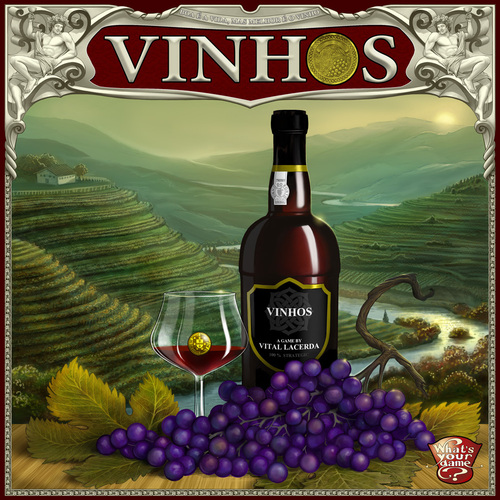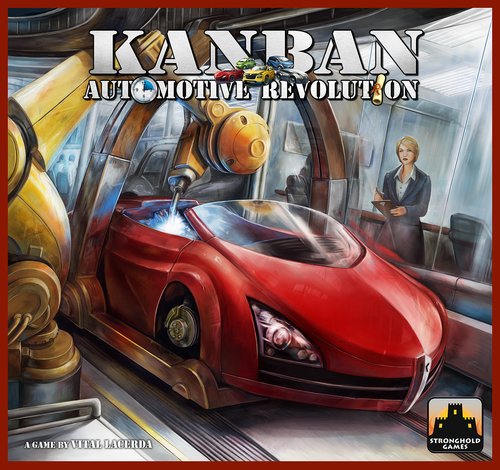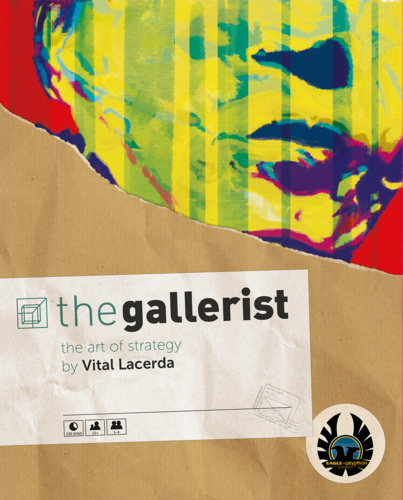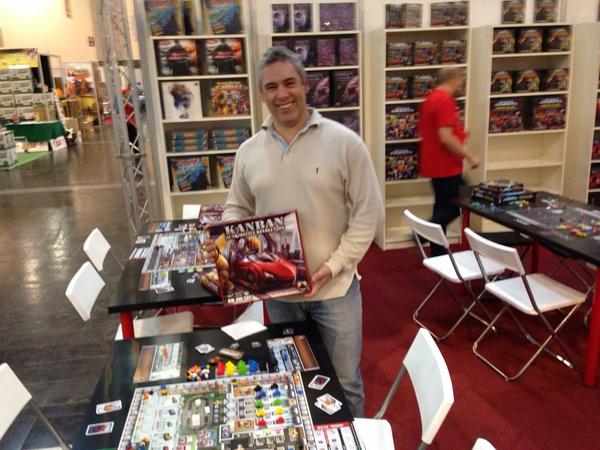Continuiamo la nostra rassegna delle interviste per i giochi nominati per il premio Goblin Magnifico con Vital Lacerda, autore di Kanban: Automotive Revolution (appunto tra le nomination del premio 2015) e del recente The Gallerist.
Prima di iniziare volevo ringraziarvi per la nomination al fantastico premio “Goblin Magnifico”. È un onore per me accettarla e sapere che i giocatori italiani giocano e si divertono con uno dei miei titoli.
1) A cosa giochi di solito? Quali sono i tuoi autori e generi preferiti?
Gioco un po’ a tutto. Family, filler, giochi di medio livello, giochi impegnativi, ma la mia preferenza va ai giochi lunghi e sostanziosi. Mi piacciono le sfide e mi piace ragionare mentre gioco, pertanto mi piace quando un gioco mi stupisce, quando scelgo la mossa migliore o prendo la decisione migliore.
I miei autori preferiti sono Martin Wallace, Mac Gerdts, Feld.

2) Come autore quanto pensi sia importante giocare? Volendo fare una stima quale percentuale di tempo spendi a provare i tuoi giochi, quanto ne spendi a provare i giochi/prototipi di altri autori e quanto tempo dedichi a giocare quello che ti piace?
Penso che sia molto importante per un autore essere anche giocatore. Sarebbe troppo strano per un autore non giocare a niente. Come farebbe a conoscere le ultime meccaniche e le ultime tendenze? Come farebbe a conoscere le novità, cosa è buono e cosa non lo è? Per me un autore che non gioca è come uno scrittore che non legge. Cosa molto strana.
Mi organizzo per dividere il mio tempo tra il playtest e i giochi degli altri autori. Mi considero un “gamer” e mi piace seriamente giocare. Cerco di giocare almeno due volte a settimana. Posso dedicarmi al playtest più spesso da quando ho iniziato ad utilizzare Tabletopia, un fantastico sistema per giocare online.
3) Parliamo di Kanban: Come si è evoluto il gioco dall'inizio alla fine? È cambiato molto? E in quali aspetti, principalmente?
Beh, ci ho messo 4 anni per finirlo. Il titolo, il cuore del gioco e il tema sono le uniche cose che non sono cambiate. Anche il movimento di Sandra (la manager) nella fabbrica era presente dall’inizio. I principali cambiamenti sono legati alle modalità dei movimento e ai suoi compiti. Pertanto se osservi le immagini di Kanban su BGG durante i 4 anni puoi visualizzare le principali differenze tra tabellone e meccaniche.
4) I tuoi giochi, pur essendo degli eurogame, hanno sempre una forte ambientazione: com’è nata l’idea di un gioco sull’industria automobilistica?
Stavo vedendo “Tempi Moderni”, un film con Charlie Chaplin ambientato in una fabbrica per la produzione di massa e pensai che poteva essere divertente qualcosa con quel tema. Quindi, come faccio di solito, iniziai le mie ricerche e finii per leggere del sistema Ford per la produzione di massa e di come i giapponesi combattevano gli spechi nella produzione con il sistema “lean” (produzione snella), questo portò a Kanban. Lo trovai molto coinvolgente e accattivante. Un paio di mesi dopo stavo playtestando il mio primo prototipo di Kanban.

5) Più in generale qual è il tuo approccio nel progettare giochi: parti dalle meccaniche o dall’ambientazione?
Assolutamente il tema. Non posso iniziare a lavorare al progetto di un gioco senza un tema su cui fare ricerche in primo piano. Per me non ha senso e sarebbe molto più difficile realizzare giochi.
6) Con il recente The Gallerist sei giunto a pubblicare quattro giochi (espansioni escluse): Vinhos, CO2, Kanban, The Gallerist. Quanto sono simili e quanto sono diversi?
Penso che l’unica cosa in comune sia che sono tutti partiti da un tema. Poi è seguito un paio di mesi di ricerca sul tema e sono naturalmente evoluti. Sono tutti giochi pesanti e spero che ciascuno di loro abbia profondità, decisioni difficili da prendere e differenti strategie per la vittoria. Il tema è differente e spero lo sia anche il feeling del gioco. Mi piace anche creare meccaniche innovative agganciate al tema, dove possono legarsi una all’altra come in un carosello, o una meccanica che porta il giocatore lungo un percorso, dipendentemente dalle proprie decisioni.
7) Hai esordito con giochi pubblicati con editori tradizionali per arrivare a progetti finanziati con sistemi crowdfounding. Cosa è cambiato? Come ti sei trovato nelle differenti esperienze?
Per me non è cambiato niente. La politica dell’editore non è una mia scelta. Con la Eagle Game ho avuto tanta libertà per creare i miei giochi. Posso scegliermi il team di sviluppo, portare avanti il playtest e creare qualsiasi cosa mi piaccia, loro si limitano a supervisionare e a collaborare, ma non impongono niente.
Ho sperimentato con loro un grande senso di fiducia nel mio lavoro, ed è quello che cerco in un editore. Il loro contratto è per me molto vantaggioso, ma la loro politica è di affidarsi al crowdfounding per avere una migliore previsione di quanto il gioco possa vendere. Non è per niente una decisione che riguarda me.

8) Secondo il tuo parere come influenzerà il crowdfounding il mondo dei boardgame?
Spero nel miglior modo possibile. Per ora sta aprendo la porta a nuovi autori, il che è una buona cosa. Permette anche un livello di produzione più alto da parte dell’editore, e questo consente di pagare meglio gli autori. Nel complesso la vedo come una cosa positiva, ovviamente. Ma c’è anche una controparte. Tanti giochi non ben sviluppati, e a volte anche incompleti. Però, in generale, penso che il fenomeno aiuterà a far crescere l’industria. E questa industria sta crescendo in maniera prosperosa, il che porterà ad un più alto livello di professionalità, consentendo di avere giochi di qualità superiore e con il livello di produzione più alto; dal momento che gli editori inizieranno a pagare meglio le persone coinvolte, come playtester, sviluppatori, redattori professionali, eccetera, i giochi diventeranno più costosi, obbligando i giocatori alla scelta naturale di comprarne di meno ma migliori. Penso che sarà un bene per l’industria quando i brutti giochi inizieranno a scomparire perché non vendono, migliorando la qualità e permettendo di giocare più spesso i giochi belli.
9) Il Portogallo ha delle similitudini con l’Italia per i giochi da tavolo: certo non confrontabili con le principali scene (come la Germania), ma con un crescente numero di appassionati, di editori e di autori. Puoi raccontarci qualcosa del Portogallo e del rapporto con l’hobby dei giochi da tavolo?
Beh, siamo un mercato piccolo, ma si sta compattando. C’è un solo importante editore in Portogallo e un paio di autori con giochi pubblicati, ma stiamo crescendo, Il nostro mercato non può crescere più di tanto perché siamo un piccolo paese.
10) Quali sono i tuoi progetti per il futuro? Stai lavorando a qualche nuovo gioco?
Proprio ora sto lavorando alla seconda edizione di Vinhos, che dovrebbe iniziare la campagna di finanziamento su Kickstarter a Gennaio di quest’anno. Contiene la versione originale e una nuova versione semplificata nella stessa scatola. È un grosso progetto e spero soddisfi i fan e permetta di raggiungere nuovi giocatori.
Sto anche creando un po’ di giochi nuovi e lavorando sodo su uno in particolare chiamato Lisboa, da pubblicare con la Eagle Game nel 2016. È a uno stadio avanzato di sviluppo e lo sto giocando molto online con tante persone in giro per il mondo. È stata una bella esperienza e una eccellente nuova opportunità per il playtest.
Concedetemi una visita alla pagina di Lisboa su BGG e unitevi a una sessione online del playtest se vi piace. Pubblico su BGG le date del playtest.
Ho anche un altro paio di progetti in sviluppo, probabilmente, per il 2017, come un gioco ambientato su Marte o un vecchio progetto chiamato Escape Plan, Entrambi hanno una pagina su BGG, vedrò come si evolvono.
Ancora grazie per l’intervista e, ovviamente, per la nomination al premio, apprezzatissima.

Original interview:
Before I start I would like to thank you for the wonderful prize "Goblin Magnifico 2015". It's an honor to me to accept it and knowing that the Italian players are playing and enjoying one of my titles.
1) What do you usually play? What are you favorite authors and games?
I usually play everything, Family games, fillers, medium games, heavy games. but my preferences go to long heavy meaty games. I love challenges and I need to think during games, so I like when a game makes me wondering if I choose the best move or took the best decision.
Martin Wallace, Mac Gerdts, Feld, are my favorite designers.
2) How much, as a designer, do you think it’s important to play games? What is the percentage of time that you spend playtesting your games, playtesting prototypes of other authors and playing what you like?
I think it's very important that the designer is a gamer too. it would be very strange a game designer that does not play any games. How the designer would know the last mechanics and tendencies. How would be the novelties, and know what is good and what is not. To me, a designer who does not play games would be like a written who doesn’t read. Very strange indeed.
I manage to divide my time between playtesting and play other author games. I’m a gamer and I really love to play. I try to play at least twice a week. I can playtest more often now since I started to use Tabletopia, an awesome online system to play boardgames.
3) Let’s talk about Kanban: How did the game evolve from the beginning till the end? Did it change much? And in what aspects, mainly?
Oh, the game took me 4 years to be finished. The name, the core of the game, and the theme were the only things that did not change during the game. I also had Sandra moving on the factory since the beginning. the big change was the way she moves and her tasks. So if you look at Kanban pictures on BGG for about 4 years ago, you can spot big differences in the board and mechanics.
4) Your games are Eurogame with a prominent theme; how the idea of a game on the automotive industry showed up?
I was watching a Modern Days, a movie with Charlie Chaplin settled in a mass production factory and I thought something like that could be fun. Then as I usually do begin my research and end up reading about the ford mass production system and later on how the Japanese fight the waste left in the mass production by using a lean system, that lead to Kanban. I though that veery exciting and captivating. A couple of months later I was playtesting my first prototype of kanban.
5) More generally, what is your approach to design games? Do you prefer to start from mechanics or theme?
Theme. I cannot start working in a game project if I don’t have the theme to research at the first place. Does not make sense to me and it will be much harder to design.
6) With the recent The Gallerist you come to publish four games (expansions excluded): Vinhos, CO2, Kanban, The Gallerist. How similar and how are they different?
I think the similarities are that all started from a theme. Then a few months of researching about its theme and after that they just naturally just evolved. They are all heavy games and I hope every one of them have some deep, hard decisions and many paths to victory. They are different in theme, and I hope the play feeling. I also enjoy creating innovative mechanics related to the theme, where they can be connected to each other like a carousel or a mechanism that leads the player along a path, depending on their decisions.
7) You started out with games published by traditional publishers to get crowdfunding projects. What has changed? How did you get the different experiences?
To me, nothing change. The publisher politics is not my choice. With Eagle Games, they gave me a lot of freedom to create my games. I can choose all my team, I do my playtesting and create whatever I want, they just advise and work with me, but don’t impose anything. With them, a great sense of trust in my work and this is all I can look to work with a company. Their contract is very good to me, but their politics is to do a crowd funding to have a better understanding how much the game can sell. Not my decision at all.
8) In your opinion how crowdfunding will influence boardgames?
Hopefully in the most positive way. For now it's opening doors to new designers, that is a good thing. It also allows better production values from publishers and if this provides a better pay to designers, I can see it as a good thing, of course. but it also has the downside. A lot of not well-playtested games, and sometimes even unfinished games. But in general, I think it will help the industry to grow.
and the industry is growing wealthy and that will lead to a higher professionalization, providing high-quality games with better productions values, but since publishers start to pay more people, like playtesters, developers, professional editors, etc.. games will also become more expensive, leaving players with the natural choice of buying fewer games but better ones. I think it will be very good the industry since the bad games start to disappear because they don’t sell, improving the game's quality and the best game is played more often.
9) Portugal has similarities with Italy for boardgames: certainly not comparable to the main scenes (such as Germany), but with a growing number of fans, publishers, and authors. Can you tell us something of Portugal and of the relationship with the board gaming hobby?
Well, we are a very small market, but is grouping. there is only one important publisher in Portugal and a couple of designers with published games, but it's improving, but our market cannot grow much because we are a small country.
10) What are your future projects? Any new game you may talk about?
Right now I'm working in the second version of Vinhos, to be a KS in January this year. It brings the original version and a new simplified version inside the same box. Its a huge project that I hope leave its fans happy and reach new players.
I’m also creating a few new games and working very hard in one game called Lisboa, also to be published with Eagle Games in 2016. The game is in very advanced stage and I'm playtesting a lot online with many people around the world. It has been a great experience and aa great new way to the future of playtesting.
Pay me a visit at the Lisboa page on BGG, and join me to an online playtest of the game if you want. I place the playtesting dates there.
I also have a couple of new projects in development probably to 2017 like a game settle in Mars or an old project called Escape Plan. Both have a page on BGG already, will see what happens.
Once again, thank you for the opportunity and of course the prize that I much appreciated.
all the Best
Vital




 Continuiamo la nostra rassegna delle interviste per i giochi nominati per il premio Magnifico Goblin con Vital Lacerda, autore di Kanban: Automotive Revolution (appunto tra le nomination del premio 2015) e del recente The Gallerist.
Continuiamo la nostra rassegna delle interviste per i giochi nominati per il premio Magnifico Goblin con Vital Lacerda, autore di Kanban: Automotive Revolution (appunto tra le nomination del premio 2015) e del recente The Gallerist. 


